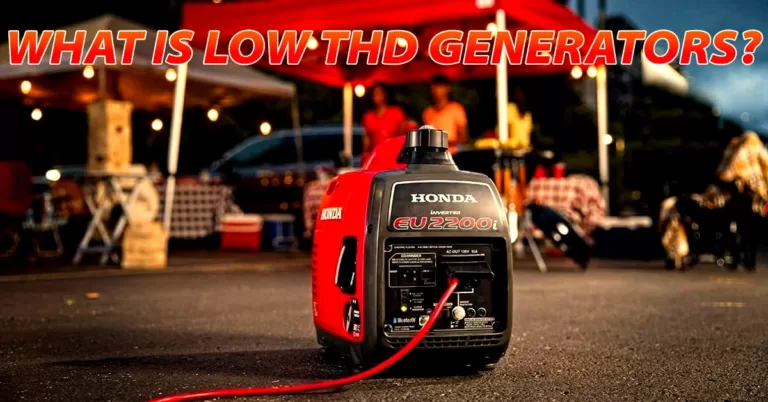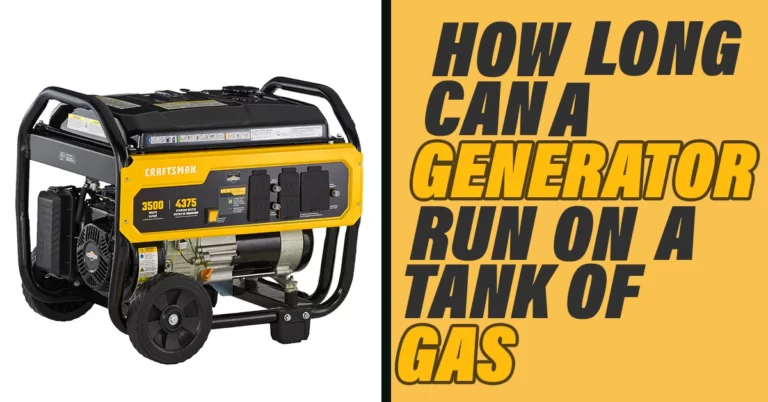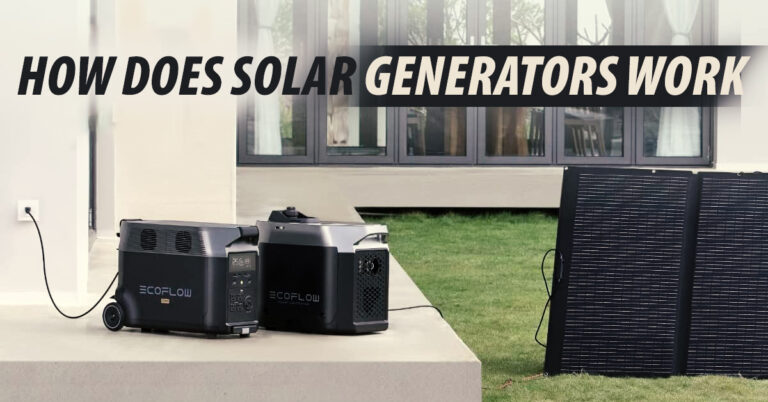How to Reduce Generator Fuel Consumption?
Generators, which run on fuels like gasoline, propane, and diesel, can be costly to operate when fulfilling your power needs. To address this issue, one might wonder how to reduce generator fuel consumption.
There are nine effective methods to achieve this: timely servicing and maintenance, managing carbon deposits for fuel efficiency, minimizing generator usage, avoiding overloading and underloading, optimizing coolant temperature, ensuring proper ventilation, selecting the right fuel, and considering alternative power sources. These approaches help lower fuel consumption, and for detailed insights into each method, read on as We’ll look at each of these methods in more detail.
9 Ways to Reduce Generator Fuel Consumption
If you’re seeking an answer to the question “How to Reduce Generator Fuel Consumption,” you’ll find 9 effective ways to reduce generator fuel consumption:
Carbon Deposit Management for Fuel Efficiency
When deposits of carbon gather in generators on parts like injectors, valves, and piston tops, it can cause the generator to emit black smoke and use more fuel. To reduce fuel consumption and maintain efficiency:
- Regularly remove carbon deposits from your generator using a gentle chemical detergent or manual cleaning.
- After cleaning, change the oil to ensure optimal performance.
- Timely removal of carbon deposits is essential to prevent increased fuel consumption.
- If you’re unsure about the cleaning process, consult your generator’s manufacturer’s manual or seek guidance from the manufacturer or a local dealer.
Avoid Overloading and Underloading for Fuel Savings
To use less fuel in generators, make sure not to overload or underload them:
Overloading means using too much power, and it makes the generator use more fuel. Match the generator’s power with what you need to avoid overloading. Overloading can make a generator use 25 to 30% more fuel. Get expert advice when buying a generator to make sure it fits your needs without being pushed too hard.
Underloading means using too little power, like running the generator below 50% of what it can do. This can make it work badly, use more fuel, and not last as long. So, use the right amount of power and don’t waste it.
Even if you have a good generator like Champion or Honda, don’t use too much power, and find the best amount for saving fuel. Please pay attention to how much power you use because running the generator with too little power can also waste fuel due to working badly when it’s not doing much.
Generators can use more fuel when they run at the wrong speed and this wastes fuel that doesn’t get used.
Fuel Efficiency with the Right Coolant Temperature
Keeping the right temperature for the coolant is really important for using less fuel in diesel generators. If it’s too cold, the fuel doesn’t burn completely, and that’s bad for the environment and a waste of fuel. If it’s too hot, the engine parts rub together too much, making the generator use more fuel and wear out faster. Most diesel generators work best when the coolant is between 180 and 200 degrees Fahrenheit (82 and 93 degrees Celsius). You should check the temperature with the generator’s gauge to make sure it runs well and doesn’t use too much fuel.
Proper Ventilation for Fuel Savings
Proper ventilation is essential to optimize generator fuel consumption. It ensures fresh oxygen reaches the combustion chamber, enabling efficient and complete combustion of the air-fuel mixture. If there’s not enough airflow, the generator uses more fuel and doesn’t work as well. Here are some tips for good airflow:
- Put the generator in a place with lots of air, not in a small place like a shed or garage.
- Keep at least 3 feet of space all around the generator.
- Don’t cover it with things like tarps or canopies.
- Make sure the places where air goes in and out of the generator are clear.
- If you use the generator inside, use a fan to move the air around.
Choosing the Right Fuel for Your Generator
Using the right fuel in your generator is really important to make it use less fuel and work better. Different fuels burn in different ways, which affects how well your generator works. Here’s what you need to know:
- Using cheap or the wrong fuels can make your generator not work as well, and it can create more dirty stuff and use more fuel.
- Each generator needs a specific type of fuel to work its best.
- Look in your generator’s manual to find out which fuel it needs.
For generators, there are several fuel choices, and each has advantages and disadvantages.
- Diesel: It’s common and strong, but it can make bad stuff in the air.
- Gasoline: It’s common and not too expensive, but it’s not as strong and makes bad stuff in the air.
- Natural gas: It’s clean and good for the environment, but it’s more expensive and needs a special connection.
- Propane: It’s clean and cheaper than natural gas, but you need a propane tank for it.
- Biofuels: They’re friendly to the environment, but they can be more expensive than diesel or gasoline.
When you pick a fuel, think about things like how much it costs, if you can get it easily, what it does to the air, and if it works with your generator. Your choice can help you to use less fuel and spend less money on running your generator.
Generator Use When it Really Need To Saving Fuel.
To use less fuel with your generator, only use it for things you really need. Generators work best when they’re not always running and should be used mainly for emergencies, not all the time. So, only turn on the generator when you have to do things like taking a shower, cooking, or cleaning.
Saving Fuel with Generator Maintenance
Regularly having experts maintain your generator can make it use less fuel by stopping problems and making it work well. Always use real replacement parts to avoid more problems and use more fuel. To save fuel:

Cutting Generator Fuel Usage with Alternative Power Sources
Using different power sources can really help you use less fuel in your generator and make it work better. Here are some examples:
- Solar panels can make your generator use less fuel during the day, so you don’t need as much at night.
- Wind turbines can give power to your generator when it’s windy, so you don’t have to use as much fuel when it’s calm.
- Hydroelectric generators can help your generator when there’s water flowing, so it doesn’t use as much fuel when there’s no water.
- Battery storage systems save power from the sun or wind, so you can use it in your generator when there’s no sun or wind.
Using these different power sources can save you money, be better for the environment, and make sure you have power when you need it while using less fuel in your generator.
Choosing the Right Generator for Fuel Savings and Efficiency
Picking a good generator is super important for saving fuel and spending less on using it. The best generators use less fuel to make the same power. Some good brands known for not using too much fuel are Generac, Cummins, Champion, Honda, Duromax, and others.
When you’re choosing a generator, think about these things:
Fuel efficiency:
Get a generator that’s good at using fuel so it can make more power without using too much fuel.
Power factor:
Choose a generator that can turn electricity into power efficiently.
Engine size:
Make sure the generator has an engine that’s the right size for what you need.
Brand reputation:
Trust generators from brands that are known for making good quality, fuel-efficient, and long-lasting products. When you get a high-quality generator, you can save on fuel and how much it costs to use it.
Best Tips to Reduce Generator Fuel Usage
To use less fuel in your generator, try these tips:
- If you use the generator for business, think about having another power source like solar energy or strong inverters to use less generator power.
- Use the generator for important things and use it less for things that aren’t necessary.
- Use the generator when the most power is needed, so you don’t run it when you don’t have to.
- Make your machines and equipment use less energy to save power and make the generator run less, which is really helpful for businesses.
Why is Reducing Generator Fuel Consumption So important?
There are several approaches to comprehending the significance of fuel generator usage. Here’s the reason it matters:
Save Money:
When you use less fuel, you spend less money on running the generator. This is especially important in places where generators are used a lot.
Help the Environment:
Using less fuel means there’s less pollution, like carbon dioxide, in the air. Generators can produce harmful stuff like greenhouse gases, nitrogen oxides, and tiny bits in the air.
Make the Generator Last Longer:
If you use the generator at full power all the time, it can wear out faster. Using less fuel and not running it at full power can make it last longer, which means you won’t have to spend money on a new one.
Be More Secure With Your Energy:
Using less fossil fuel and finding other ways to get power makes you more independent and less likely to have problems if there are issues with energy.
You can prolong the life of your generator, save money, and protect the environment by using less fuel in it.
What Factors Influence a Generator’s Fuel Consumption?
Many things affect how much fuel a generator uses:
- The brand of the generator matters. Some brands are better at saving fuel than others.
- New generators use less fuel than old ones.
- Smaller generators use less fuel than big ones.
- The more electricity the generator makes, the more fuel it uses.
- If you connect more things to the generator, it uses more fuel because it has to make more electricity.
- Taking good care of the generator by doing maintenance keeps it from using too much fuel.
Other things also affect how much fuel the generator uses:
- Generators work better in cooler weather.
- They don’t work as well in high places.
- Some things you can add to the fuel can help the generator use less fuel.
How May Fuel Efficiency Be Increased in a Generator Through Maintenance?
Maintaining your generator improves its performance. A few things are done to the engine during maintenance to increase efficiency:
Clean Burns
Changing filters, using clean oil, and servicing the engine helps it burn fuel better. If it doesn’t burn fuel well, it’s a waste, and you don’t get much power.
Smoother Movements
When you check how the engine’s parts move, like the piston, crankshaft, and valves, it keeps the engine working smoothly and not doing extra work.
Less Damage
Regular maintenance keeps the engine from getting worn out and damaged. When the engine parts rub together, they can get damaged, and it depends on how well you take care of the engine.
Easy Work
A well-maintained generator works easily and doesn’t struggle because of old oil, clogged filters, or the wrong fuel.
Good Lubrication
Keeping the engine well-lubricated with clean oil and filters is important for saving fuel and making the engine last a long time.
Staying Cool
The engine needs to stay at the right temperature to save fuel and work well. You have to clean the radiator and cooling parts and check for leaks.
Fuel System
Keeping the fuel system clean and working well is important for saving fuel. You need to clean the fuel tank and lines and change the fuel filters to make the engine work better.
Less Rubbing
Good maintenance stops the parts in the engine from rubbing too much, which saves fuel and keeps the engine in good shape.
Right Temperature
The engine has to stay at the right temperature, and maintenance makes sure it does to save fuel.
Cleaning the Engine
Over time, the engine can get dirty with things like carbon. Regular maintenance checks and cleaning help keep the engine clean.
Examples of how maintenance might reduce fuel use are as follows:
- A dirty air filter can make the generator use up to 10% more fuel.
- A dirty fuel filter can make the generator use up to 5% more fuel.
- A dirty radiator can make the generator use up to 3% more fuel.
- Old or dirty oil can make the generator use up to 5% more fuel.
Follow the schedule for maintenance that the manufacturer gives you and do basic things like changing the oil and air filter. Your generator will use less fuel.
How Can I make My Generator Use Less Fuel?
To make your generator use less fuel and work better, it’s a good idea to use it in the early morning and late afternoon when it’s not too hot or too cold. Only use the generator for important things like showering, cleaning, and cooking. That way, it will work well because very hot or very cold weather can make it use more fuel.
Businesses use the generator when lots of power is needed to save money and prevent the power grid from getting overloaded. In places far from power lines, the generator can make life more comfortable and useful. To save fuel and make the generator work the best, only use it when you really need it, not for things like using a laptop or having fun.
How Fuel Efficiency Can Be Improved with External Generator Additions
There are several external additions and strategies to improve fuel efficiency when using a generator, and you can employ:
| External Additions | Description |
|---|---|
| Aftermarket air intake | Improves engine airflow, which promotes greater combustion and increased fuel economy. |
| Aftermarket exhaust system | Reduces back pressure and enhances fuel economy. |
| Fuel injector upgrade | Improves fuel atomization, resulting in better combustion and fuel efficiency. |
| Intercooler | Cools intake air for denser air and improved combustion. |
| Turbocharger or supercharger | Increases air pressure entering the engine, resulting in more power and improved fuel efficiency. |
Which Aspects Should I Take Into Account While Selecting a Generator?
It is important to consider how you will utilize the generator when selecting one for your purposes. For certain purposes, several generators perform better than others.
Selecting the Optimal Generator for Your Requirements
It would help if you decided how you’re going to use the generator, whether it’s for your home, office, or someplace far away. Different generators are better for different jobs. For example, a generator for an office is different from one for a house or a place that’s hard to get fuel to.
Diesel Generators for Strong Power
Diesel generators are good for making a lot of power and using fuel efficiently. Even though they’re big, they don’t need to go very fast to make power, which helps them save fuel, especially when they use good diesel fuel.
Gasoline Generators:
Gasoline generators are easy to find and use, so they’re good for emergencies. But they’re not the best at using fuel efficiently. The good thing about them is that you can take them with you, so they work well for small power needs. But they might not be the cheapest option if you need a lot of power for a long time.
Natural Gas Generators for Saving Money
Natural gas generators can be a good way to save money on fuel, especially if natural gas is cheap where you live. They might cost more to install at first, but they can use up natural gas pretty fast. They make less power than a gasoline generator of the same size.
Solar Power for Clean and Efficient Energy
Solar power is a really good way to make power without polluting. It’s especially cost-effective after you pay for the solar panels and other stuff you need. But you have to have a lot of space for the panels, and the batteries you use don’t last very long. To make it work really well, you can save the money you would spend on fuel to get better batteries later.
FAQs
-
Do Generators Use Less Fuel With Less Work?
Yes, generators use less fuel when they have less work to do, especially when the work is below 50% of what they can do.
-
Can a Generator Run Without Doing Any Work?
Generators can run without doing any work, but it’s not a good idea. When they run without doing work, they don’t work well, and it can even damage the engine.
-
What’s The Best Way to Make a Generator Use Less Fuel?
The best way is to pick the right generator, take good care of it, use the right amount of power, and use machines that don’t use too much power. Changing the generator with extra things can make it not last as long.
-
Can a Generator be Perfect at Using Fuel?
No, generators can’t be perfect at using fuel. They lose energy, don’t work perfectly, and make heat when they make power.
-
When is a Generator The Best at Using Fuel?
Generators work best when they’re doing about 70-80% of what they can do.
-
Why Does The Generator Consume More Fuel When It’s not Working Much?
When the generator isn’t doing much work, it uses more fuel because it doesn’t burn the fuel completely, and it doesn’t work well. It makes it use too much fuel and not work efficiently.
-
What is The Hourly Fuel Consumption of a Generator?
How much fuel the generator uses depends on what type it is, how much work it’s doing, and how big it is. Small generators can use a few liters of fuel in an hour, while big ones for industries can use hundreds of liters in an hour.
End Words
Reducing generator fuel consumption is essential for saving money, protecting the environment, extending generator lifespan, and enhancing energy security. By implementing these nine effective methods and using your generator wisely, you can enjoy the benefits of reduced fuel usage and increased efficiency. Remember that the right generator choice, regular maintenance, efficient power management, and considering alternative power sources can go a long way in achieving these goals. Suppose you’re wondering How to Reduce Generator Fuel Consumption. In that case, these approaches offer practical solutions to help you achieve this goal effectively.







